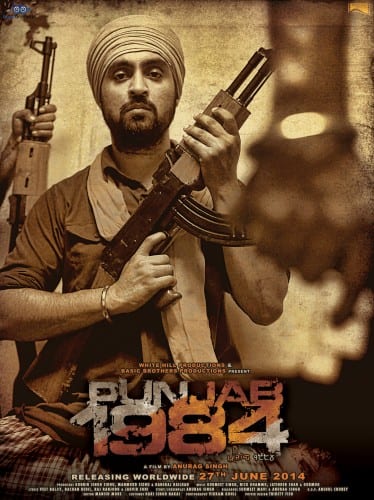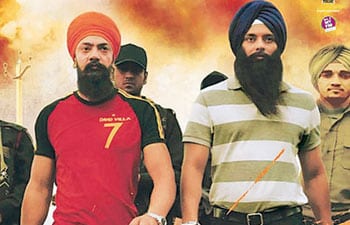 Last night, I went to a showing ofPunjab 1984. Writing when you’re emotional has its place, but I chose to step away from my immediate feelings after walking out of the theatre last night and reflect on how I actually felt after I was able to separate myself from that experience somewhat.
Last night, I went to a showing ofPunjab 1984. Writing when you’re emotional has its place, but I chose to step away from my immediate feelings after walking out of the theatre last night and reflect on how I actually felt after I was able to separate myself from that experience somewhat.
I stepped into that theatre not entirely knowing what to expect, but not expecting something likeSadda Haq (which I thought was really well done). And then the movie started and I was taken aback by the realness of the images before me, by the humanness of the families being portrayed and by the storyline that was developing. It drew feeling out of you.
Just to get you up to speed, Shivjit Singh (Diljit) is a kharku singh who is moved to join the Khalistan freedom movement after his father is killed in the 1984 attack on Darbar Sahib—his death justified by Punjab police with a baseless allegation that he was a terrorist—and he himself is tortured in police interrogation.
Experiencing firsthand the brutality of the Punjab Police and injustice within India’s judicial system, he takes up armed resistance against the state. Were I to have walked out of the theatre before the end of the first half, I would have had trouble writing a coherent review encouraging you to watch it because I was truly moved by the humanness of the story that was being depicted.
But then comes the second half. For those who have seen it already and those who are going to see it, you may have different reactions to this portion. The second half of the film is largely dedicated to portraying the film’s perception of the actions of Sikh Freedom Fighters. Emphasis on the word ‘perception’.
The first major depiction is of Shivjit Singh placing explosives on a bus full of innocent people, which his “higher-ups” demanded of him.
The next was imagery of kharkus (freedom fighters) lining up innocent Hindus, even those who were Khalistani sympathizers, and shooting them with as much discrimination as the Punjab police. After that came the killing of a rehatvaan (spiritually disciplined) kharku singh by corrupted “kharku singhs”. Suddenly I was no longer teary-eyed and emotional over the film, but aware that I needed to analyze the content with a sobered sense of detachment.
You can question what the purpose in these portrayals was. Perhaps, in the filmmaker’s eyes, it was to reflect the human reality of those placed on all spectrums of the Punjab struggle. Perhaps it was to appease those in Punjab who have an interest in preventing outright sympathy with the Khalistan movement. Perhaps it was the film’s attempt to make everyone happy. The practical implication, however, was that most Khalistani freedom fighters are self-interested, manipulative and corrupted.
The implication of this portrayal of the Khalistan movement was that if you are not the type of person to critically analyze the media that you are viewing, or do not have a solid base of knowledge on 1984 and the freedom movement to begin with, or were simply drawn into the emotional roller coaster that the film was attempting to take you on, you would leave with the perception that the struggle for Khalistan was obsolete because the only kharku who can remain true to his cause is a fictionalized, idealized character played by Diljit.
The practical implication, however, was that most Khalistani freedom fighters are self-interested, manipulative and corrupted.
This is where it should start concerning you that one of the main characters who you can sympathize with and believe in throughout is a famous, well-known celebrity. Celebrities are different than real people, right? Only someone so plainly exceptional could have come out of the movement so morally unscathed, right?
 Where Sadda Haq acted as a well-written argument for the relevance of the Punjab freedom movement, Punjab 1984 was an emotional trip that attempted to humanize a political struggle while forgetting (perhaps conveniently) to build a factual base for the emotional content that was being showered upon the audience. For someone walking into that theatre with limited background knowledge to see the main portrayal of a freedom fighting group as being succumbed to corruption and openly opposing Sikh values, a judgment is going to be made about the overall sincerity of the Khalistan movement. If this film was packaged as a reflection of the Khalistan movement, the producers should have spoken to actual freedom fighters and those central to the Khalistan movement before attempting to create a script. Creating judgments from the sidelines about a movement with deep complexities was plainly irresponsible on the production team’s part.
Where Sadda Haq acted as a well-written argument for the relevance of the Punjab freedom movement, Punjab 1984 was an emotional trip that attempted to humanize a political struggle while forgetting (perhaps conveniently) to build a factual base for the emotional content that was being showered upon the audience. For someone walking into that theatre with limited background knowledge to see the main portrayal of a freedom fighting group as being succumbed to corruption and openly opposing Sikh values, a judgment is going to be made about the overall sincerity of the Khalistan movement. If this film was packaged as a reflection of the Khalistan movement, the producers should have spoken to actual freedom fighters and those central to the Khalistan movement before attempting to create a script. Creating judgments from the sidelines about a movement with deep complexities was plainly irresponsible on the production team’s part.
By no means am I saying that every individual involved in the Khalistan movement was a reflection of Sikh values. That is the humanness of any freedom struggle. Humans don’t come pre-labelled as good or bad—it is a spectrum. But for this film to portray the steadfast and morally true kharkus as the rare minority was backwards and harmful. It is not a reflection of the ideological roots of the Khalistan movement and serves to undermine the validity of that struggle. The factual reality is that most of the moral issues and killings of innocents portrayed in the movie was done by the government and its undercover operatives—not freedom fighters.
This film did little justice to the ideology of the Khalistan movement. No doubt, it left you feeling emotional and charged up, but I question whether the emotional build-up was actually a good thing. Without proper context established for 1984 and without proper explanation for the purpose of Khalistan—other than what you can infer through emotion—the audience is left with dangerous gaps. Yes, it’s important to feel and to experience through emotion, but hasn’t our community been doing that for long enough? What we are missing is dialogue and critical analysis. To charge up an audience and leave them ultimately feeling disillusioned to everyone in this film but an idealized celebrity figure is wrong in my opinion.
I would not encourage someone with no background information about the Khalistan movement to watch this film and accept it as even a remotely accurate portrayal of Khalistani freedom fighters or the ideology of the Khalistan movement. I think the primary benefit in viewing this film, however, is for the purpose of analysis and critical discussion. If you watch the film, take out the time to really analyze the content that’s being presented to you. It’s easy to see through the lens of emotion and lose sight of the problematic content being represented, especially from a film that was widely advertised in Gurdwaras worldwide.

